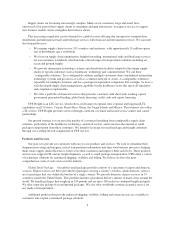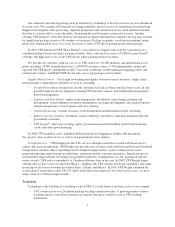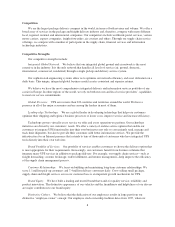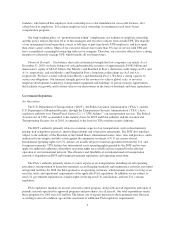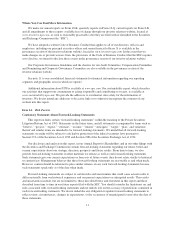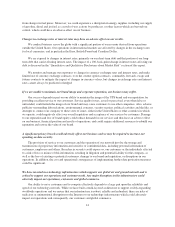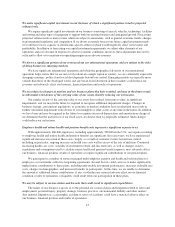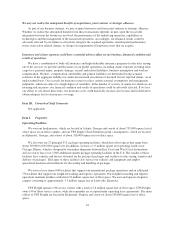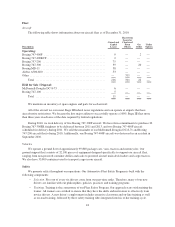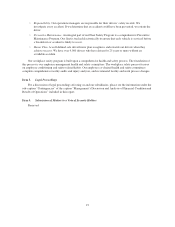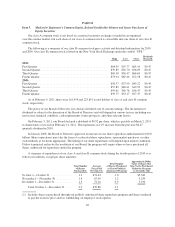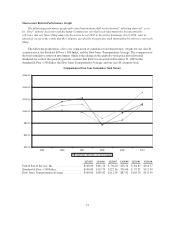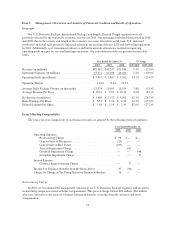UPS 2010 Annual Report Download - page 26
Download and view the complete annual report
Please find page 26 of the 2010 UPS annual report below. You can navigate through the pages in the report by either clicking on the pages listed below, or by using the keyword search tool below to find specific information within the annual report.from changes in fuel prices. Moreover, we could experience a disruption in energy supplies, including our supply
of gasoline, diesel and jet fuel, as a result of war, actions by producers, or other factors which are beyond our
control, which could have an adverse effect on our business.
Changes in exchange rates or interest rates may have an adverse effect on our results.
We conduct business across the globe with a significant portion of our revenue derived from operations
outside the United States. Our operations in international markets are affected by changes in the exchange rates
for local currencies, and in particular the Euro, British Pound and Canadian Dollar.
We are exposed to changes in interest rates, primarily on our short-term debt and that portion of our long-
term debt that carries floating interest rates. The impact of a 100-basis-point change in interest rates affecting our
debt is discussed in the “Quantitative and Qualitative Disclosures about Market Risk” section of this report.
We monitor and manage our exposures to changes in currency exchange rates and interest rates, and make
limited use of currency exchange contracts, over the counter option contracts, commodity forwards, swaps and
futures contracts to mitigate the impact of changes in currency values, but changes in exchange rates and interest
rates cannot always be predicted or hedged.
If we are unable to maintain our brand image and corporate reputation, our business may suffer.
Our success depends in part on our ability to maintain the image of the UPS brand and our reputation for
providing excellent service to our customers. Service quality issues, actual or perceived, even when false or
unfounded, could tarnish the image of our brand and may cause customers to use other companies. Also, adverse
publicity surrounding labor relations, environmental concerns, security matters, political activities and the like, or
attempts to connect our company to these sorts of issues, either in the United States or other countries in which
we operate, could negatively affect our overall reputation and acceptance of our services by customers. Damage
to our reputation and loss of brand equity could reduce demand for our services and thus have an adverse effect
on our business, financial position and results of operations, and could require additional resources to rebuild our
reputation and restore the value of our brand.
A significant privacy breach could adversely affect our business and we may be required to increase our
spending on data security.
The provision of service to our customers and the operation of our network involve the storage and
transmission of proprietary information and sensitive or confidential data, including personal information of
customers, employees and others. Breaches in security could expose us, our customers or the individuals affected
to a risk of loss or misuse of this information, resulting in litigation and potential liability for the company, as
well as the loss of existing or potential customers, damage to our brand and reputation, or disruptions in our
operations. In addition, the cost and operational consequences of implementing further data protection measures
could be significant.
We have invested in a technology infrastructure which supports our global air and ground network and is
critical to support our operations and customer needs. Any major disruption to this infrastructure could
adversely impact our operations, customers and global commerce.
Our ability to serve customers and to compete effectively depends to a large part upon the reliability and
speed of our technology network. While we have built a multi-layered architecture to support swiftly-expanding
worldwide operations and we ensure that our infrastructure is robust, reliable and redundant, there are risks of
malicious or unintentional disruptions to the Internet or our technology infrastructure which could adversely
impact our operations and consequently, our customers and global commerce.
14


